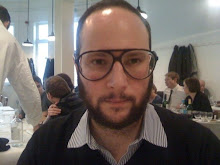Wednesday, 31 May 2006
Tuesday, 30 May 2006
NOTHING REALLY MATTERS WHEN YOU WEAR A BIG MOUSTACHE!

Nothing Really Matters- When You Wear A Big Moustache!
(Los Super Elegantes and Pablo Leon de la Barra)
21.00 Thursday 31st May 2006
Sculpture unveiling by Pablo Leon de la Barra at Karaiskaki Square followed by performance by Los Super Elegantes at the Roof Garden of Athens Imperial Karaiskaki Square, Athens, Greece
Exhibition Duration 31st May-30th June 2006
Los Super Elegantes and Pablo Leon de la Barra have been invited to present their work for the first time in Athens, Greece, in the exhibition, “Nothing Really Matters - When You Wear A Big Moustache!” Their projects work both as investigations into as well as projections of cultural fantasies onto Athens, a modern city full of contemporary complexity as well as ancient myths and history.
Los Super Elegantes will perform and sing their songs on the roof garden of the Athens Imperial Hotel with the Parthenon as their backdrop. The exhibition will also feature the video clip of their latest single, “Nothing Really Matters” which they will have produced in Athens. The video clip will bring together a synopsis of Greek history as interpreted through films, music and the media with Onassis era clothing, ancient ruins, an infamous Acropolis nightclub as well as many a toga clad backup dancer.
Meanwhile, Pablo Leon de la Barra, inspired by the Greek War of Independence Hero, Karaiskakis (on whose namesake square the exhibition is taking place) and his eminent moustache, will produce a monument in his honor. Through research into the social and urban fabric of the surrounding area of the square Leon de la Barra will investigate the construction of myth, identity and masculinity in contemporary Greece through the aesthetic politics of the moustache.
The exhibition that will follow the performances will take place in the artists’ bedrooms in the hotel and will last for a month. The video clip of “Nothing Really Matters” will be exhibited alongside props from the making of the videoclip as well as a temple-installation in homage to great Greek male and female moustaches.
Milena Muzquiz (Tijuana, 1974) and Martiniano Lopez-Crozet (Argentina, 1968) formed Los Super Elegantes in San Francisco in 1995; they live and work in Los Angeles. Their first musical album Channelizing Paradise was released in 2002. Los Super Elegantes were featured in the 2004 Whitney Biennial, in the same year they created the highly successful Slow Dance Club as part of the Frieze Art Fair 2004 Art Project Commissions. Los Super Elegantes work has been reviewed in numerous publications including ArtForum, Index, Purple, Interview and many others.
Pablo Leon de la Barra is both an artist and a curator from Mexico (1972). He is also editor of Pablo Internacional Magazine, curator of White Cubicle Toilet Gallery and co-director of Blow de la Barra gallery in London where he lives. He has curated exhibitions such as To Be Political it Has to Look Nice, 2003 at Apexart in New York and exhibited amongst other places at Localismos, 2004 Mexico City; Going Public ’05 Communities and Territories, 2005, Larissa Contemporary Art Center; Tropical Abstraction, 2005, Stedelijk Museum; BMW- 9th Baltic Triennial, 2005, CAC-Lithuania and ICA-London and Globos Sonda/Trial Balloons, 2006, MUSAC, Spain.
Sponsored by Attica Bank and Classical Hotels
With the support of the US Embassy in Athens
For further information please contact-
Maria-Thalia Carras or Sophia Tournikiotis
locus@locusathens.com
0030 6944 719 209
www.locusathens.com
Sunday, 7 May 2006
'LUCHA LEONESA' WRESTLING DEMONSTRATION ORGANIZED BY PABLO LEON DE LA BARRA AT MUSAC AS PART OF THE EXHIBITION 'GLOBOS SONDA'








Antonio Zaya, Pablo Leon de la Barra and Octavio Zaya wearing 'I Love Leon' tshirts by Funky Projects
Lucha Leonesa
Demonstration of Leones Wrestling
MUSAC, León
May 2006
Leones Wrestling is an original sport of the province of León, Spain. It is fought
by two wrestlers, in similar form to the Canaries wrestling or the Japanese. The
wrestling takes place within a circle of about 15 meters of diameter. The fighters
must dress with short trousers and a t-shirt, they cannot use footwear.
Characteristically, they wear a leather belt of about 3 cm wide; this belt is placed
in the waist, over the hip, so that it can easily be taken hold by the adversary. The
objective is, by means of certain techniques denominated mañas, to make the
opponent touch the ground with any part of their back, with which the winner
obtains two points. If it touches the ground with the stomach or the arms, a point is
obtained. The first to obtain 4 points wins.
Lucha Leonesa is one of the oldest native sports that still persists in Spain. Its
origin is thought to be pre-Roman. It conserves a certain rural and primitive
flavour, which reminds of its origin. In the XIV century Leones Wrestling was
used in the Leones Mountains to solve border conflicts due to cattle grazing.
There is no cause that by itself can explain the conservation of the tradition of
Leones Wrestling. This might be due to topography and deficient communication
routes that prevented the relation of the area with the exterior; this social and
cultural isolation allowed that the ancestral customs and traditions remained virgin
during a long time. This united to the particular Leones way of life and the defense
of its roots and customs. The Leones character has always stayed very resistant to
external influences.
Subscribe to:
Comments (Atom)























